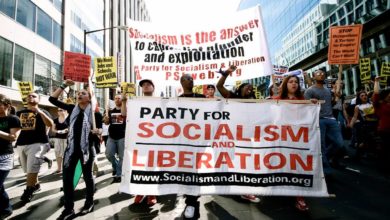Following
is a talk given in a panel titled “Resisting U.S. imperialism: Is it just bad
policies or the system?” at the Nov. 13-14, 2010, National Conference on
Socialism sponsored by the Party for Socialism and Liberation.
Throughout
its ignoble history, U.S. imperialism has had as its goal the domination and
exploitation of the people and resources of China.
As
a matter of fact, one key component of the brutal annexation of the Philippines
in 1898 was the strategic position the Philippines offered as a base of
operations against China’s vast population, geographical expanse and rich
natural resources.
In
words of the early imperialist Albert Beveridge in 1900, “The Philippines are
ours forever, and just beyond the Philippines are China’s illimitable markets.
We will not renounce our part in the mission of our race, guided by God, to
civilize the world. God has not been preparing the English-speaking and
Teutonic people for nothing … He has made us the master organizers of the
world.”
The
language has changed somewhat, but the goal is the same.
The
great Chinese Revolution of 1949 transformed China from an impoverished nation
with a primarily peasant population, suffering widespread mass starvation and
famine under the boot of Western imperialism, and facing mass opium addiction
imposed by British colonialism, to an economy organized using socialist
planning and methods to meet the needs of all its people.
To
this day, the United States and its junior imperialist partners are determined
to overthrow the gains of the revolution by regaining full and unfettered
access to China’s industries, labor and natural resources.
What
is impeding them is the dominating role of the Chinese Communist Party.
When
the revolution triumphed in 1949, China was plagued by economic
underdevelopment—the legacy of years of colonial and imperialist domination.
Overcoming underdevelopment was critical for socialism—no reorganizing of
society can meet people’s needs when there is widespread scarcity.
Starting
in the mid-1950s there developed a two-line struggle within CCP over how best
to accelerate China’s economic development. Mao Zedong and his supporters advocated socialist methods, both as a
means to build up the economy and to safeguard the integrity of the socialist
character of the revolution. The wing led by Liu Shaoqi and Deng Xiaoping
advocated a pragmatic method, including opening the country to foreign
capitalist corporations and promoting capitalist market methods. Both sides
agreed on the goal, which was to overcome the legacy of economic
underdevelopment.
By
1978, the wing led by Deng had emerged victorious. Capitalist reforms did bring
economic development to China—but at the same time, it brought capitalist
relations back, and strengthened capitalist forces that are inherently
counterrevolutionary and opposed to socialism.
As
socialists, we have a critical perspective of the capitalist reforms that have
taken place in China. But we also understand that Washington is not hostile
toward China because it has departed from socialist methods; it is hostile
because that departure has not gone far enough.
The
ruling social order in China has moved toward the restoration of capitalist
property relations, private property has been legalized and encouraged, and
many of the largest western transnational capitalist corporations and banks
have been permitted to set up operations throughout China, while large numbers
of Chinese workers are exploited by imperialist corporations allowed to do
business in China. Despite these facts it is very clear that the prevailing
view of the imperialists is that the Chinese government has not gone far
enough, that the Communist Party threatens foreign imperialist investment and
undermines the possibility of China’s becoming a fully market-based economy.
Their goal is the overthrow and destruction of the Communist Party to the point
where it would no longer have control of development and foreign trade.
There
is no doubt that the overthrow of the Communist Party would represent a
historic setback for China, returning it to the reality of grinding poverty,
super-exploitation and oppression of days gone by.
There
is no doubt that the Chinese revolution represented a total shock to the
imperialist world. “Who lost China?” was debated throughout the corridors of
capital.
The
drumbeat of China bashing that has been ongoing since the revolution has
escalated recently, including increased anti-China rhetoric in the U.S.
Congress and harsh criticism from President Obama.
Today,
TV ads trying to scapegoat China as the source of the U.S. economic crisis are
increasing. Many of the attacks are openly racist and thoroughly disgusting.
Unfortunately,
some U.S, trade unions are participating in this chorus orchestrated by the
imperialists who are targeting China for its broad economic growth, and framing
up China as the reason U.S. workers are out of work, instead of targeting the U.S.
banks and corporations who are really the cause of the crisis.
China
is indeed a global power in competition with the United States and its
imperialist partners. Also, China has increased trade with emerging economies
trying to get out from under the boot of neo-liberalism, which has devastated
the economies of countries in South America, Africa and Asia. Even though these
policies by China are mainly driven by pragmatism and the desire to grow its
economy, rather than proletarian internationalism, they are shifting somewhat
the world balance of power as countries are able to turn away in relief from
U.S. financial domination and exploitation.
In
exchange for access to resources, China has invested in infrastructure and
technical assistance for its trade partners, particularly in Africa. China has
used its vast currency reserves to extend loans with much lower interest rates
and longer repayment periods than those from Western commercial banks. These
mutually beneficial relations depart from the World Bank/IMF model of aid with
strings attached that is meant primarily to facilitate imperialist dominance.
Reconstruction
in Angola, which was ruined by a counterrevolutionary war backed by U.S.
imperialism, has been helped by three Chinese oil-backed loans under which
Chinese companies have built roads, railways, hospitals, schools and water
systems.
A
$3 billion loan from the Chinese government will help the Democratic Republic
of Congo fund railways, roads, hospitals and universities. A joint mining
venture between Congo and China gives Congo 32 percent share, far superior to
the typical 7 to 25 percent for similar deals with other companies.
Facing
a U.S.-blockade for the past 50 years, Cuba has found an important partner in
China. Cuba’s trade with China is only second to its trade with Venezuela. The
two countries have joint investments in nickel, oil and biotechnology. China
has exported buses and locomotives to Cuba helping the country’s transport and
public transit system battered by the blockade.
The
United States wants the CCP to relinquish its control over the means of
production and trade policies, to “open up” China to increased imperialist
penetration. The imperialists hope that the faction for full-blown capitalist
restoration in the Chinese party will prevail and is upset that this does not
appear to be happening.
Despite
the right-ward turn of those termed the “capitalist roaders,” led by Deng
Xiaoping and others after Mao Zedong’s death in 1976, millions of peasants were
liberated from serfdom under the revolution. As Mao said at the time of the
revolutionary victory of 1949, “China has stood up!”
The
imperialists are gearing up to continue to seek a complete overthrow of the
revolution, from without and within.
In
the face of this threat it is the responsibility of all revolutionaries and
progressive people to resist the imperialist offensive and offer militant
defense against counterrevolution in China—despite our profound differences
with their policies of so-called “market socialism.”






